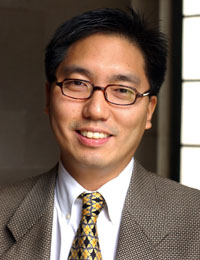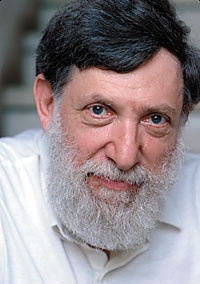 | Marvin Chun |
A cognitive neuroscientist who has inspired hundreds of Yale students in his "Introduction to Psychology" course and a retired English professor who was recently named Connecticut's new poet laureate have been honored with this year's William Clyde DeVane Award.
Marvin Chun, a professor of psychology, and John Hollander, the Sterling Professor Emeritus of English, were presented with DeVane Awards at the annual spring banquet of the Yale Chapter of Phi Beta Kappa on Feb. 20.
Conferred since 1966, the DeVane Award (formerly known as the DeVane Medal) is a prestigious tribute to excellence of scholarship and teaching. It is the oldest and highest-ranking award for undergraduate teaching at Yale. The award is named for William Clyde DeVane, who was dean of Yale College 1938-1963 and served as president both of the Yale and United chapters of Phi Beta Kappa. DeVane was also a member of the Phi Beta Kappa Senate.
Graduate members of Phi Beta Kappa select a retired faculty member for the honor, and Yale College seniors who are members of the society choose an honoree from among active faculty members who have been teaching at Yale for at least five years. Thus, Hollander was chosen by alumni and Chun was elected by undergraduates.
Steven Stearns, the Edward P. Bass Professor of Ecology and Evolutionary Biology, was the keynote speaker at the dinner. As the Phi Beta Kappa poet, Louise Glück, adjunct professor of English and the Rosenkranz Writer-in-Residence, presented a poem she had written for the occasion.
Stephanie Hanson '08 introduced Chun by quoting a description of the Yale psychology professor made by a group of 137 of his former and current students, who asserted, "Marvin Chun is the man!"
"When I took his class three years ago, I sat among about 150 students -- a group just large enough to fill Luce Hall," said Hanson. "Since then, word has spread, and this fall Professor Chun lectured to almost 300 students in SSS [Sheffield-Sterling-Strathcona Hall], where every single one of his lectures was capped off with an enthusiastic round of applause. As his Facebook group poignantly proclaims, 'how many of your professors start out class playing great music, walk around handing out candy on Valentine's Day, and give an extended discourse (WITH power point slides) on why you should not worry if you got a C on the midterm (or in the class for that matter)?"
Hanson also quoted one of the research assistants in Chun's laboratory, who said his lab leader's "excellence as a scientist is surpassed only by his humility and the genuine care with which he treats those in the lab and in the classroom."
"Each of his lectures is filled with explanations and demonstrations that are designed to ensure that students grasp even the most difficult concepts," added Hanson. "Whether it is through beating teddy bears or crawling on tables, he engages his students in interactive lessons that tend to instill a genuine interest in psychology."
Chun's lab employs neuroimaging and behavioral techniques to study how people perceive and remember visual information. His work in visual attention focuses on why people can consciously perceive only a small portion of all of the sensory information coming through the eyes. His memory research explores the neuronal correlates of memory encoding and retrieval, and he is also interested in how attentional mechanisms and memory processes interact, as well as in the fundamental question of how people recognize objects.
Chun also teaches in the interdepartmental Neuroscience Program and the Cognitive Science Program. In April, he will receive the Troland Research Award from the National Academy of Sciences in recognition of his outstanding scientific achievements.
Mary E. Miller, the Vincent J. Scully Professor of the History of Art and graduate president of Phi Beta Kappa, introduced Hollander at the dinner.
"What generations of Yale students know -- and as long as I have known this campus, I have known students who rave of [his] class, right up to last night, when they were filling my ears with the marvels of sitting in seminar last year -- is that the conversation is of the highest order, on serious subjects, with words carefully chosen. Words connect to music, and his students hear the sound of work and hauling in the sea shanty, even hearing their famous professor sing."
Added Miller, "From the moment that W.H. Auden selected John Hollander's 'A Crackling of Thorns' in 1958 for the Yale Younger Poets Award, he has been widely acclaimed as one of the finest poets of the later 20th century. There are so many other things John Hollander has achieved, writing operatic and lyric works, editing the words of others, especially the Library of America's two-volume anthology of 19th-century American poetry, and offering light verse beloved by the young (and the old who read it to them)."
Hollander, who retired in 2003 after teaching at Yale for decades, has written 22 books of poetry, several works of criticism and numerous anthologies, as well as books for children and operatic and lyric works with composers such as Milton Babbitt and George Perle. His "Rhyme's Reason" is the definitive handbook for teaching poetry and has influenced generations of students. He has also taught the writing of verse as well as the reading and interpretation of it. In his teaching and writing he has explored relations between art and literature as well as between music and poetry.
In addition to being named Connecticut's poet laureate, Hollander has been honored with the Bollingen Prize, the Levinson Prize and the Modern Language Association's Shaughnessy Medal, as well as fellowships from the MacArthur Foundation, the Guggenheim Foundation and the National Endowment for the Arts. A former chancellor of the Academy of American Poets, he received the 1997 Connecticut Governor's Arts Award. He has just begun serving his five-year term as Connecticut's poet laureate.
Phi Beta Kappa, the nation's oldest undergraduate honors organization, was founded in 1776 at the College of William and Mary in Williamsburg, Virginia. Four years later, the original Phi Beta Kappa Society was abruptly forced to cease operations as the British army under Cornwalis advanced on the city. The year before, however, the society had already granted charters to Yale and Harvard, making them the second and third chapters of the organization, respectively.
Last year, the Yale Chapter of Phi Beta Kappa presented DeVane Awards to economist Benjamin Polak and art historian Jules D. Prown. Previous winners of the award have included historians Edmund S. Morgan, Howard R. Lamar, Jonathan Spence and John Gaddis; literary scholars Cleanth Brooks, Maynard Mack and Marie Borroff; political scientist Robert A. Dahl; economist James Tobin; and sociologist Kai Erickson.
T H I S
Marvin Chun and John Hollander
are honored by Phi Beta Kappa
Marvin Chun

John Hollander
John Hollander
 W E E K ' S
W E E K ' S S T O R I E S
S T O R I E S![]()
 Major gift to fund construction of Loria Center for the History of Art
Major gift to fund construction of Loria Center for the History of Art![]()
![]()
 Scientists determine ancient Peruvian citadel was earliest solar . . .
Scientists determine ancient Peruvian citadel was earliest solar . . .![]()
![]()
 For students, spring break will be a time of discovery, service
For students, spring break will be a time of discovery, service![]()
 SOM travel goes green
SOM travel goes green![]()
![]()
 Researchers discover treatment for lethal kidney disease
Researchers discover treatment for lethal kidney disease![]()
![]()
 Professor and trustee awarded India's highest civilian honor
Professor and trustee awarded India's highest civilian honor![]()
![]()
 Study implicates gene defect in early heart disease
Study implicates gene defect in early heart disease![]()
![]()
 Marvin Chun and John Hollander are honored by Phi Beta Kappa
Marvin Chun and John Hollander are honored by Phi Beta Kappa![]()
![]()
 Yale will help build DNA databank to further research on autism
Yale will help build DNA databank to further research on autism![]()
![]()
 Scientists clarify why colliding ice blocks interlace
Scientists clarify why colliding ice blocks interlace![]()
![]()
 Negative health effects of soft drink consumption confirmed in study
Negative health effects of soft drink consumption confirmed in study![]()
![]()
 Exhibit looks at contributions of early women healers
Exhibit looks at contributions of early women healers![]()
![]()
 Yale nurses Linda Pellico and Geralyn Spollett are lauded . . .
Yale nurses Linda Pellico and Geralyn Spollett are lauded . . .![]()
![]()
 Past, present and future Elis are named Soros Fellows
Past, present and future Elis are named Soros Fellows![]()
![]()
 Study finds that yearning -- not disbelief -- is defining feature of grief
Study finds that yearning -- not disbelief -- is defining feature of grief![]()
![]()
 Record number of city students taking part in annual science fair on campus
Record number of city students taking part in annual science fair on campus![]()
![]()
 Conference to explore new collaborations with Turkey
Conference to explore new collaborations with Turkey![]()
![]()
 IN MEMORIAM
IN MEMORIAM
 B. Davie Napier: Former Yale trustee, professor and preacher
B. Davie Napier: Former Yale trustee, professor and preacher![]()
 James B. Crowley: Specialist in the history of modern Japan
James B. Crowley: Specialist in the history of modern Japan![]()
 Paul Sevier Minear: A leading scholar of the New Testament
Paul Sevier Minear: A leading scholar of the New Testament![]()
 Kathryn Perrone: Assistant to the president
Kathryn Perrone: Assistant to the president![]()
![]()
 Campus Notes
Campus Notes![]()
Bulletin Home |
| Visiting on Campus
Visiting on Campus |
| Calendar of Events
Calendar of Events |
| In the News
In the News![]()
Bulletin Board |
| Classified Ads
Classified Ads |
| Search Archives
Search Archives |
| Deadlines
Deadlines![]()
Bulletin Staff |
| Public Affairs
Public Affairs |
| News Releases
News Releases |
| E-Mail Us
E-Mail Us |
| Yale Home
Yale Home